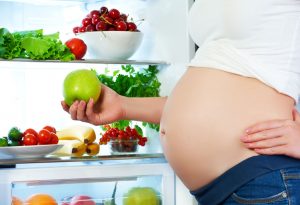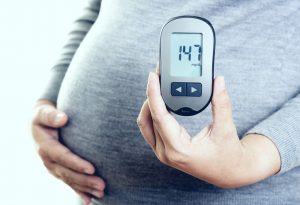In this Article
- Is it Normal to Feel Extremely Thirsty During Pregnancy?
- Causes of Excessive Thirst During Pregnancy
- Symptoms of Excessive Thirst During Pregnancy
- How to Deal With Extreme Thirst During Pregnancy
- When You Should Be Concerned About Excessive Thirst During Pregnancy
- Foods That Keep You Hydrated During Pregnancy
Pregnant or not, you might feel sudden thirst and the urge to drink plenty of water at times during the day. Usually, people say that drinking eight glasses of water is the norm, but pregnant women may need to drink a little more than that. However, feeling excessively thirsty while you’re pregnant might still need looking into. Here, we will talk about whether this phenomenon is normal and whether you need to tell your doctor about it or not.
Is it Normal to Feel Extremely Thirsty During Pregnancy?
For most women, increased thirst during pregnancy is entirely normal. Your body simply needs more fluids to function properly. Also, you’re drinking water not only for you but for the little one inside you as well. However, it is understandable for you to wonder whether it is a normal part of pregnancy or due to some underlying medical cause. Let’s explore more, below.
Causes of Excessive Thirst During Pregnancy
Here are some factors that can lead to you feeling excessively thirsty during pregnancy:
1. Low Blood Pressure
Around the time when you are 24 weeks pregnant, it is normal to experience a dip in blood pressure. When this happens, your heart has to work more to pump more blood. This will contribute to increased thirst. There are also a few other symptoms you may experience with this dip in blood pressure, including feeling faint, nausea, dizziness, blurry vision, and breathing abnormalities.
2. Increase in Blood Volume
Pregnancy can increase the volume of blood in your body by about 40 percent. Your body will need this extra amount of blood to provide your baby with nutrients and oxygen and ensure proper cell development. To replenish this additional need for blood, your body will need more water, thereby, increasing thirst levels.
3. Certain Foods or Drinks
When you eat salty food or food with lots of spices, you may become thirsty all of a sudden. If you find yourself feeling excessively thirsty after eating or drinking certain things, it’s best to avoid them for some time.
4. Not Being Hydrated Enough
Most women often find themselves feeling the need to pee more often during pregnancy. You will likely feel more thirsty in the earlier stages of pregnancy, as your body is telling you to take in more fluids for yourself and your baby. As your baby grows in your womb, the amniotic sac (fluid-filled chamber protecting your baby) grows larger as well. Your body needs more fluids to help rid itself of waste produced from your normal functions, as well as waste being produced by your baby. Some women, especially ones who live in warmer climates, will find that their thirst is due to more sweating.
5. Pressure on the Bladder
As the baby continues to develop and grow, your womb will expand and start to press down on your bladder, causing the urge to urinate more frequently and drink more fluids. As you expel more fluids, your thirst will increase.
Symptoms of Excessive Thirst During Pregnancy
The main symptom of excessive thirst during pregnancy is suddenly or constantly feeling dehydrated and needing to drink water. Other symptoms include-
• Have a feeling of dryness in the mouth
• Swelling of hands, feet, or ankles
• Needing to urinate more frequently
How to Deal With Extreme Thirst During Pregnancy
Increased thirst during pregnancy can be frustrating, as it means constantly feeling thirsty and in need of water. Most pregnant women need to drink eight to ten glasses of water or other fluids each day. If you are physically active or live in a warm climate, it will be more. It can also be all the more difficult If you are coping with nausea and morning sickness. Here are some tips to tackle excessive thirst during your pregnancy –
- Sip on lemon water to reduce nausea and vomiting and still get the required fluid intake.
- Suck on ice chips, popsicles and other frozen treats throughout the day to help increase fluid intake without getting a stomach upset.
- Reduce salt in your diet to avoid feeling thirsty so often.
- Eat more fruits and vegetables with high water content.

• Sometimes you may be so busy that you forget to drink enough water, contributing to increased thirst. Install an app on your computer or phone that reminds you to drink water at regular intervals throughout the day.
• Drinking water is important, but drinking too much can also prove to be harmful. So, regulate the amount to what your doctor recommends.
When You Should Be Concerned About Excessive Thirst During Pregnancy
It is best to talk to your doctor to ensure that excessive thirst during pregnancy is due to normal reasons and not any cause for concern. When you reach later stages of pregnancy, you should be very careful while analysing your symptoms. Your increased thirst level could be due to the uterus putting pressure on your bladder, making you urinate more frequently. This can happen more in the latter part of pregnancy, as compared to the earlier part. Your body needs to replenish the rapid loss of fluids. However, the above may also point to start of gestational diabetes, especially if you feel constant fatigue along with urinating frequently.
The doctor may insist on a blood sugar test, also known as a glucose tolerance test if she suspects that you have gestational diabetes. If your numbers are higher than 140mg/DL, you may be at risk of developing gestational diabetes. Gestational diabetes is very common during pregnancy, as when you are pregnant, your body has to produce more insulin to keep up with all the changes. If your body is not able to produce the right amount of insulin required, you may develop gestational diabetes.
If you had gestational diabetes during an earlier pregnancy, the chances of developing it in your current pregnancy are higher. Make sure you tell your doctor about previous cases of gestational diabetes, so the appropriate measures can be taken.

While this condition may be serious, it can be treated smoothly if caught early on. Warning symptoms of gestational diabetes are –
• Urge to urinate frequently, especially at night.
• A feeling of dryness in the mouth.
• Feeling excessively tired, even if you have slept well.
• Impaired vision.
• Infections that happen too often, like thrush.
Foods That Keep You Hydrated During Pregnancy
When it comes to staying hydrated during pregnancy, drinking too much water may make you feel bloated. Instead, incorporate these foods into your pregnancy diet to add to your water intake and reduce the need to gulp down glasses of water.
1. Cucumber
Cucumbers have a 95% water content, and are the perfect crunchy accompaniment to meals, or can be eaten alone as a snack. You can even incorporate cucumbers into a salad or have long slices of cucumber with a dip.
2. Watermelon
Known for their high water content, watermelons are recommended to anyone facing dehydration or low hydration. These taste great and keep you feeling hydrated throughout the day.
3. Muskmelon
Another melon with a high water content, muskmelons are a great choice if you’re looking for something that isn’t too sweet, yet hydrates you. Cut cubes of muskmelon and store them in the refrigerator for an instant snack, every time you feel hungry or thirsty.
4. Curd
Curd has high water content and also boosts protein and calcium intake. You can even make a glass of buttermilk for more hydration. Go easy on the salt, though.
5. Lettuce
Another crunchy delight, lettuce has high water content and tastes great in salads, with dips, or by itself. A definite win-win.
There is no reason to worry if you experience excessive thirst during pregnancy, as it is usually normal. To ease your mind as well as eliminate any underlying medical cause, speak with your doctor and follow her advice properly.









